9 Cinnamon Essential Oil Benefits, Uses, And Side Effects
Use this aromatic oil to treat diabetes, fungal infections, and ulcers, among other things.
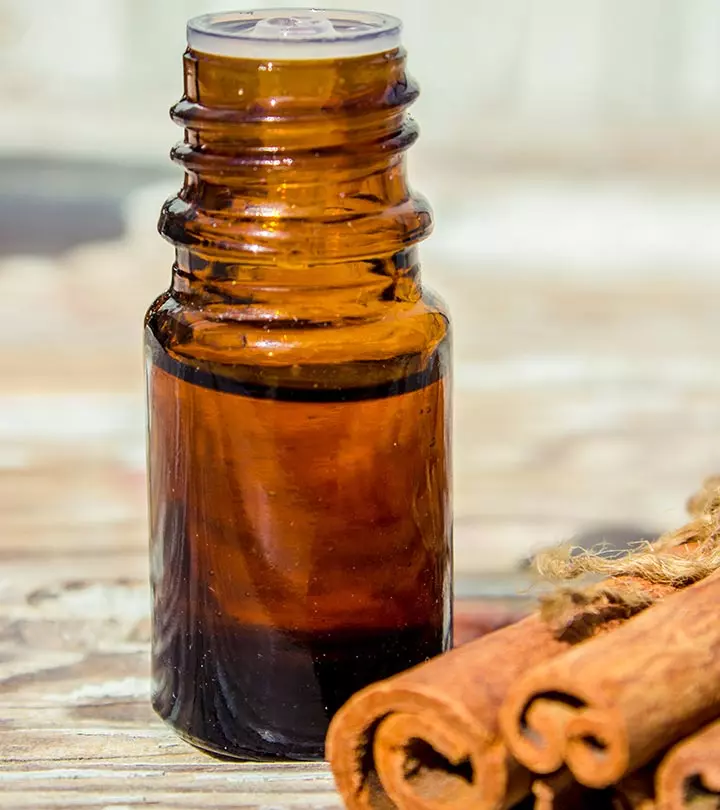
Image: Shutterstock
In aromatherapy, cinnamon essential oil is majorly used for its pleasant fragrance. It has a uniquely sweet and warm aroma. Cinnamon essential oil benefits health in numerous ways. It is extracted from the leaves and the bark of the cinnamon tree.
While the oil is primarily known to benefit hair, its uses for skin and health are also getting popular. For instance, in a study, cinnamon oil had shown anti-cancer activity against the cancerous cells of the neck and head. In an organ model, it also reduced the growth of the tumor (1).
Here, we discuss the therapeutic benefits of cinnamon essential oil, along with its preparation and uses. Continue reading further to know more.
 Know Your Ingredient: Cinnamon Essential Oil
Know Your Ingredient: Cinnamon Essential OilWhat Is It?
An essential oil derived from the leaves and the bark of the cinnamon tree.
What Are Its Benefits?
Promotes a healthy heart, controls diabetes, reduces stress, increases alertness, helps treat fungal infections and prevents gastric ulcers.
Who Can Use It?
All except those taking paracetamols or with liver conditions.
How Often?
Topically in a 1:1 ratio, orally and as a dietary supplement daily.
Caution
Always do a patch test before using it to avoid allergic reactions on the skin. Consult a doctor before consuming it if you are on diabetes medication or have liver issues.
In This Article
What Are The Health Benefits Of Cinnamon Essential Oil?
Cinnamon essential oil (CEO) contains important compounds that may promote heart health and aid diabetes treatment.
Its antioxidant properties may help prevent cancer and combat skin inflammation. In aromatherapy, this plant-based oil can help treat stress, boost alertness, and promote relaxation.
1. May Promote Heart Health

Cinnamon oil may help reduce cholesterol levels and combat oxidative stress.
It reduced the cholesterol levels in broiler chickens (2).
In another study, cinnamon oil was found to exhibit superoxide dismutase-like activity (an enzyme that helps the body combat oxidative stress) (3).
2. May Aid Diabetes Treatment

Research suggests that cinnamon oil may help regulate blood glucose levels. This may help individuals with diabetes.
In a study, a mixture of essential oils (including cinnamon oil) helped lower the levels of circulating glucose (4).
In another mice study, cinnamon oil was found to have a regulative role in blood glucose levels. It also improved the functioning of pancreatic islets (a group of cells in the pancreas that release hormones, including insulin).
The study also saw an improved glucose tolerance in mice (5). Thus, cinnamon oil may be useful in the treatment of type 2 diabetes mellitus.
3. May Aid Cancer Treatment
The cinnamon essential oil showed anticancer activity against cancers of the prostate, lung, and breast
(6).
In studies, cinnamon essential oil exhibited significant anticancer activity against head and neck squamous cell carcinomai A common type of cancer that forms on squamous cells that constitute the outer and middle layers of skin. cells. The oil could achieve this by suppressing a specific cancer protein called EGFR-TK (1).
4. May Work As An Aphrodisiac
In animal studies, cinnamon essential oil was found to boost sexual wellness and sperm count.
Administration of cinnamon bark oil significantly increased sperm concentration in rats. However, it also decreased abnormal sperm count (7).
Cinnamomum, another species from the same family as cinnamon, may also have similar effects. Extracts of cinnamon were found to increase the weight of testes and seminal vesicles (glands that secrete semen) in male mice. The study indicates a possible hormonal stimulation in mice (8). However, there is no evidence that cinnamon essential oil can exhibit the same effects.
In another study, consumption of cinnamon bark oil was found to protect the reproductive system of male rats. The oil could also improve testosterone and sperm quality in the rats (9).
5. May Treat Ulcers

The oil may help fight the bacteria that cause ulcers.
Cinnamon bark essential oil was found to be the most potent (among other oils) against Helicobacter pylori. H. pylori is the major cause of gastric ulcers and gastric cancer (10).
Increased density of the bacteria in the gastric mucosa can aggravate gastritis. It may also increase the risk of peptic ulcers (10).
6. May Help Treat Fungal Infections
The cinnamon essential oil may help treat fungal infections, including candida. In certain cases, it could be more effective than antifungal medications.
In a study, cinnamon essential oil (along with a few others) was found to have the most potent antimicrobial properties among those tested (11).
Cinnamon oil has also been reported to be effective against various molds and yeasts. It may also have a beneficial effect against Candida (which could be resistant to fluconazole, an antifungal medication) (12).
7. May Help Manage Stress

Aromatherapy has been found to help manage stress and depressive symptoms. Aromatherapy massage using essential oils was found to be more effective than inhalation aromatherapy (13).
In a study on college students, the use of cinnamon essential oil in aromatherapy was found to increase alertness and perception and reduce frustration (14).
8. May Enhance Skin Health

Using cinnamon for skin can help reduce acne, improve complexion, and fight signs of aging due to its powerful antioxidant properties. Cinnamon bark essential oil may help treat skin inflammation and other related skin conditions. However, we need more research to determine its clinical efficacy and safety (15).
Cinnamon bark essential oil is rich in cinnamaldehyde, which demonstrated the potential in treating skin disorders. The oil can inhibit the production of several proteins involved in skin inflammation (15).
 Trivia
Trivia9. May Offer Pain Relief
Cinnamon essential oil contains cinnamaldehyde, which has anti-inflammatory and analgesic properties (26). When diluted with a carrier oil and applied topically, it may help alleviate pain by reducing inflammation and improving circulation to the affected area (27). However, it is vital to use it cautiously and in moderation, as undiluted cinnamon oil may cause skin irritation. Always conduct a patch test before widespread use, and consult a healthcare professional in case of persistent or severe pain.
Using cinnamon oil to avail its benefits is simple. There are different ways you can use the oil, and you may choose the one that suits you the most.
Key Takeaways
- Cinnamon oil may promote heart health by reducing cholesterol levels.
- It may help those with diabetes as it can reduce blood sugar levels.
- It may help treat gastric ulcers caused by bacteria.
- Cinnamon bark essential oil can help manage skin infections and inflammation.
- Avoid using cinnamon oil if you are on any medication for liver treatment.
How To Use Cinnamon Oil?
You can use the oil topically, orally, and in aromatherapy.
- Topically – Dilute it with a carrier oil (like coconut oil) in a 1:1 ratio and apply it to your skin. You may also add 1-2 drops of the oil to your body lotions and moisturizers before use.
- Orally – Add a drop of water to the oil and ingest it. You can also take it as a dietary supplement by consuming it along with a smoothie. You may also add the oil to your baked goods.
- In aromatherapy – Inhale it or diffuse it around your house using a diffuser.
Cinnamon essential oil is generally recognized as safe by the US Food & Drug Administration (16).
 Quick Tip
Quick TipYou may prepare cinnamon essential oil at home. The method is inexpensive. You may have to wait for a few weeks, though, before you can use the essential oil.
How To Prepare Cinnamon Essential Oil At Home
What You Need
- A bunch of cinnamon sticks
- 1 liter of olive oil
- A cheesecloth
Directions
- Place the cinnamon sticks vertically in a wide-mouthed jar. Fill all the space in the jar with the sticks.
- Pour in the olive oil such that the sticks are submerged.
- Place the jar in a warm area within your home. Placing it by the window (for direct sunlight) would work best.
- Let it stay for three weeks.
- Jerk the jar once or twice a day. This will help the base oil (olive oil) release the essential oil slowly.
- After three weeks, strain the oil from the jar. You can use the cheesecloth for this purpose. You can also squeeze the sticks for extracting any oil that could have remained.
It is important to understand the type of cinnamon you want to use. Cinnamon is available in different types, and they aren’t the same.
What Are The Different Types of Cinnamon Oil?
Cinnamon essential oil is available in two types – cinnamon leaf essential oil, and cinnamon bark essential oil.
While cinnamon leaf essential oil is made when the leaves go through a distillation process, cinnamon bark essential oil is made when the bark goes through the same.
The leaf oil has a higher content of eugenoli A pale-yellow, aromatic liquid extracted from certain essential oils that has antifungal, antibacterial, and antioxidant properties. , while the bark oil is rich in cinnamaldehyde. These two compounds have certain medicinal properties (17).
Cinnamon bark essential oil is the most commonly available type of the variant in the market. This is taken from the bark of any of the two different tree species – cassia or Ceylon.
While cassia cinnamon is more common of the two, it also is higher in coumarin – a natural chemical that can be toxic to the liver (18).
Ceylon cinnamon has far less concentration of coumarin and is comparatively safer. Coumarin could also be carcinogenici The potential of a substance to cause cancer. These substances can be natural like viruses and UV rays, or man-made like exhaust fumes. (19). Though expensive, Ceylon cinnamon is the preferred option.
If you are preparing cinnamon essential oil at home, ensure you use Ceylon cinnamon. The type is easy to identify – it is softer and lighter and is rolled in multiple layers. Other cinnamon types, including cassia, are darker, hard, and rolled only in one layer (19).
If you are purchasing cinnamon oil, ensure it is made from Ceylon cinnamon. You may check the bottle. Wondering where to buy cinnamon oil? You can get it from your nearest health store or online.
However, cinnamon essential oil may not be suitable for all. It has certain contraindications and side effects.
What Are The Side Effects Of Cinnamon Oil?
- Possible Skin Issues
The coumarin content in the essential oil (though quite less, if you are using oil from Ceylon cinnamon) may trigger certain skin issues. In both human and rat skin, coumarin absorption was found to be significant.
Skin contact with coumarin-containing products could lead to systemic coumarin absorption (20). Coumarin may also cause skin irritation (21). Please do a patch test before using the oil on your skin. Also, do not apply the oil directly. Mix it with a carrier oil.
Kerry, a blogger focusing on perfumes and scents, recounts her experience with cinnamon oil, noting, “The cinnamon essential oil looked a bit too much so I halved it – thank goodness I did, because even with using half the amount of the cinnamon my lips instantly swelled to twice their size and became extremely red (i)!”
- May Lower Blood Sugar Way Too Much
Cinnamon essential oil may lower blood glucose levels (4). Though there are no direct studies yet, using the oil along with your diabetes medications may lower your blood sugar levels way too much.
If you are on diabetes medication, please check with your doctor if you can ingest cinnamon essential oil.
- May Affect The Liver
Coumarin may affect the liver. Though there is no information if cinnamon essential oil may affect the liver, it is important to be on the safe side. If you have liver issues, please refrain from consuming the essential oil and consult your doctor.
- May Cause Photosensitivity
Cinnamon oil contains compounds like cinnamaldehyde and coumarin that can make the skin more sensitive to sunlight (25). It may increase the risk of sunburn or skin reactions when applied topically and exposed to UV rays. It is advisable to avoid direct sun exposure after applying cinnamon oil and consider sunscreen or protective clothing to minimize the risk of adverse reactions.
Does Cinnamon Oil Interact With Any Medications?
Individuals with liver conditions, especially when taking paracetamol, are suggested to refrain from consuming cinnamon bark oil. The cinnamaldehyde in the oil is known to deplete glutathionei A substance produced in the liver, derived from glutamic acid, cysteine, and glycerine that functions as an antioxidant. , which is a substance naturally produced by the liver (22).
If you are on diabetes medication, we suggest you speak to your doctor before consuming cinnamon essential oil.
Infographic: Cinnamon Essential Oil: How To Prepare And Use
Cinnamon essential oil is extracted from the leaves and bark of the cinnamon tree. It is known for its unique sweet scent and is a major ingredient in aromatherapy. The following infographic provides information about how you can make cinnamon oil right at home and the many ways to use it. Check it out!
Some thing wrong with infographic shortcode. please verify shortcode syntax
Cinnamon essential oil is renowned for its woody aroma. Aside from aromatherapy, its nutrient profile lends itself to many other uses. It is a good source of phytonutrients, potent antioxidants, vitamins, and minerals. The benefits of cinnamon essential oil are many. It helps promote heart health and manage diabetes. This natural antifungal also has the potential to rejuvenate your skin. The cinnamon essential oil may also serve as an aphrodisiac. Reap its benefits by applying it topically, consuming it, or using it in aromatherapy. However, do not use it in excess, as it may lower your blood sugar levels way too much or cause skin issues. Consult your doctor if you experience any adverse effects.
Frequently Asked Questions
How else can you use cinnamon essential oil?
Cinnamon essential oil can be used for cooking and baking. You can try replacing a quarter cup of your normal cooking oil with a quarter cup of cinnamon oil for your culinary needs. You can also use the oil as a salad dressing to impart a unique flavor.
You can also use the oil as a mosquito repellent. Some studies show it can destroy mosquito eggs (23). Simply mix ¼ teaspoon (24 drops) of the oil for every 4 ounces of water. You can then spray this mixture around your home, upholstery, and plants.
Can cinnamon oil burn your skin?
Yes, the coumarin in the oil may cause skin irritation. Excess use may cause burns, though there is no scientific research to support this. Hence, do a patch test before adding it to your skincare routine.
Is cinnamon oil good for hair growth?
There is no research stating that using cinnamon for hair growth snures positive outcomes. But if you want to use it for haircare, we suggest you consult your doctor first.
Is cinnamon oil good for weight loss?
There is no scientific backing stating that it may aid weight loss.
Can you put cinnamon oil on your lips?
Cinnamon oil is commonly applied on the lips to make them look plumper and more puckered up.
How long does cinnamon oil last?
It may last for 3–4 years if stored away from direct sunlight and heat in a dark colored vial or bottle. However, essential oils change over time and are best used before the date of expiry mentioned on the label.
Does cinnamon oil repel bugs?
Yes. Research suggests that eugenol, an active ingredient in cinnamon essential oil, can repel mosquitos and other bugs quite effectively due to its pungency (24).
Illustration: Cinnamon Essential Oil Benefits, Uses, And Side Effects
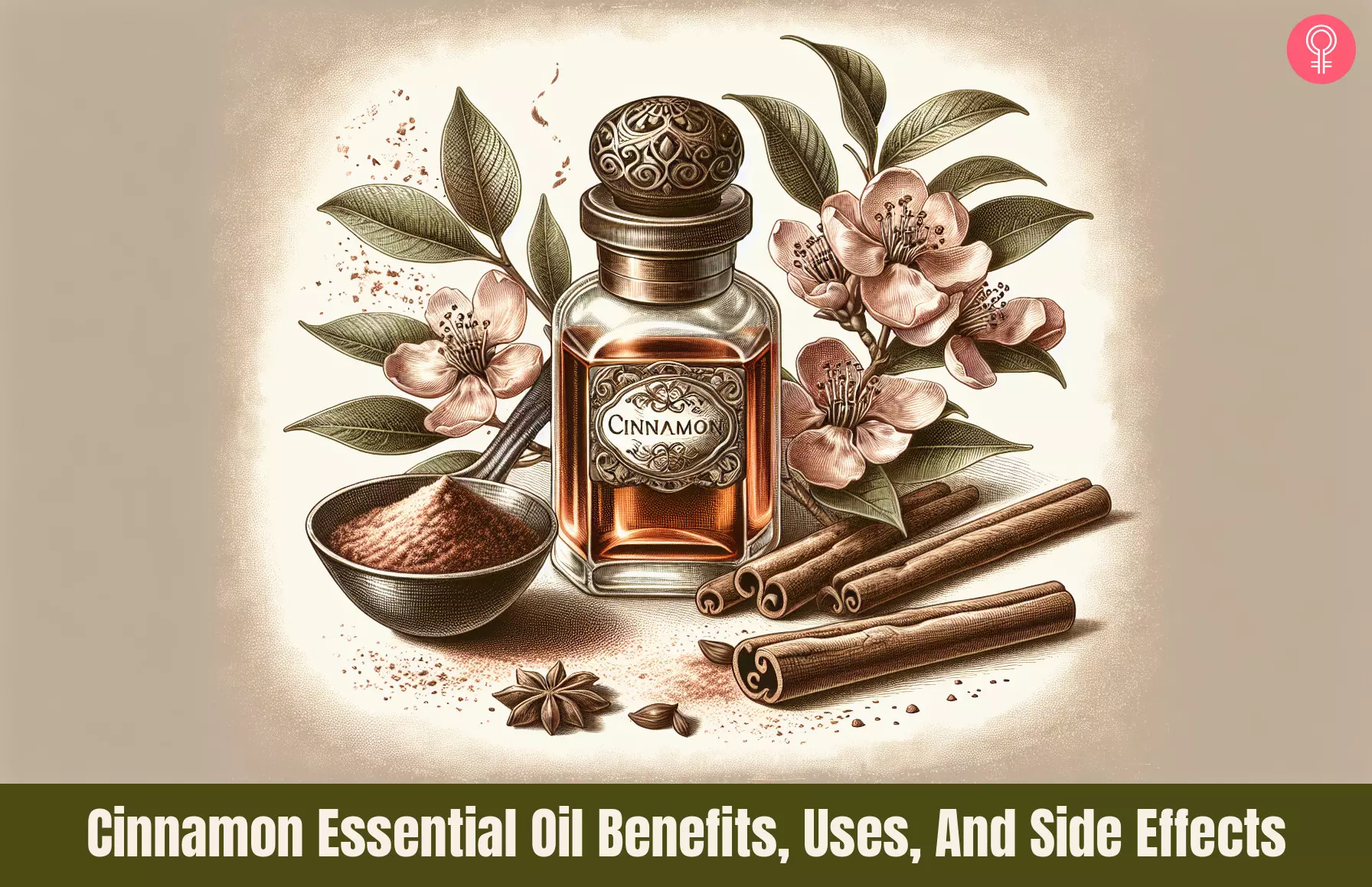
Image: Dall·E/StyleCraze Design Team
References
Articles on StyleCraze are backed by verified information from peer-reviewed and academic research papers, reputed organizations, research institutions, and medical associations to ensure accuracy and relevance. Read our editorial policy to learn more.
- Essential oil of Cinnamon exerts anti-cancer activity against head and neck squamous cell carcinoma via attenuating epidermal growth factor receptor – tyrosine kinase, Journal of B.U.O.N, US National Library of Medicine, National Institutes of Health.
https://www.ncbi.nlm.nih.gov/pubmed/26854449 - Cinnamon: A Multifaceted Medicinal Plant, Evidence-Based Complementary and Alternative Medicine, US National Library of Medicine, National Institutes of Health.
https://www.ncbi.nlm.nih.gov/pmc/articles/PMC4003790/ - A Review on Anti-Inflammatory Activity of Phenylpropanoids Found in Essential Oils, MDPI Open Access Journals.
https://www.mdpi.com/1420-3049/19/2/1459 - Effects of a novel formulation of essential oils on glucose-insulin metabolism in diabetic and hypertensive rats: a pilot study, Diabetes, Obesity & Metabolism, US National Library of Medicine, National Institutes of Health.
https://pubmed.ncbi.nlm.nih.gov/15715893/ - Antidiabetic effects of cinnamon oil in diabetic KK-Ay mice, Food and Chemical Toxicology, US National Library of Medicine, National Institutes of Health.
https://www.ncbi.nlm.nih.gov/pubmed/20561948 - Essential Oils and Their Constituents as Anticancer Agents: A Mechanistic View, BioMed Research International, US National Library of Medicine, National Institutes of Health.
https://www.ncbi.nlm.nih.gov/pmc/articles/PMC4070586/ - Efficacy of Cinnamomum cassia Blume. in age induced sexual dysfunction of rats, Journal of Young Pharmacists, US National Library of Medicine, National Institutes of Health.
https://www.ncbi.nlm.nih.gov/pmc/articles/PMC3930108/ - A Review on Medicinal Plants Used for Improvement of Spermatogenesis, Biology and Medicine, Longdom Publishing.
https://www.walshmedicalmedia.com/open-access/a-review-on-medicinal-plants-used-for-improvement-of-spermatogenesis-0974-8369-1000292.pdf - Effects of Cinnamon (C. zeylanicum) Bark Oil Against Taxanes-Induced Damages in Sperm Quality, Testicular and Epididymal Oxidant/Antioxidant Balance, Testicular Apoptosis, and Sperm DNA Integrity, Journal of Nutrition and Cancer, Taylor & Francis Online.
https://www.tandfonline.com/doi/full/10.1080/01635581.2016.1152384 - Essential Oils as Components of a Diet-Based Approach to Management of Helicobacter Infection, Antimicrobial Agents and Chemotherapy, US National Library of Medicine, National Institutes of Health.
https://www.ncbi.nlm.nih.gov/pmc/articles/PMC201172/ - Antibacterial and antifungal properties of essential oils, Current Medical Chemistry, US National Library of Medicine, National Institutes of Health.
https://www.ncbi.nlm.nih.gov/pubmed/12678685 - Antifungal Activity of Cinnamon Oil and Olive Oil against Candida Spp. Isolated from Blood Stream Infections, Journal of Clinical & Diagnostic Research, US National Library of Medicine, National Institutes of Health.
https://www.ncbi.nlm.nih.gov/pmc/articles/PMC5028442/ - The Effectiveness of Aromatherapy for Depressive Symptoms: A Systematic Review, Evidence-Based Complementary and Alternative Medicine, US National Library of Medicine, National Institutes of Health.
https://www.ncbi.nlm.nih.gov/pmc/articles/PMC5241490/ - Effects of Aromatherapy on Test Anxiety and Performance in College Students, University of North Dakota.
https://commons.und.edu/cgi/viewcontent.cgi?article=1754&&context=theses - Antiinflammatory Activity of Cinnamon (Cinnamomum zeylanicum) Bark Essential Oil in a Human Skin Disease Model, Phytotherapy Research, US National Library of Medicine, National Institutes of Health.
https://www.ncbi.nlm.nih.gov/pmc/articles/PMC5518441/ - CFR – Code of Federal Regulations Title 21, SUBSTANCES GENERALLY RECOGNIZED AS SAFE, U.S. Food & Drug Administration.
https://www.accessdata.fda.gov/scripts/cdrh/cfdocs/cfcfr/CFRSearch.cfm?fr=182.20 - Cassia oil, US National Library of Medicine, National Center for Biotechnology Information.
https://pubchem.ncbi.nlm.nih.gov/compound/Cassia-oil - The Relation between Hepatotoxicity and the Total Coumarin Intake from Traditional Japanese Medicines Containing Cinnamon Bark, Frontiers in Pharmacology, US National Library of Medicine, National Institutes of Health.
https://www.ncbi.nlm.nih.gov/pmc/articles/PMC4913087/ - Cinnamon: Mystic powers of a minute ingredient, Pharmacognosy Research, US National Library of Medicine, National Institutes of Health.
https://www.ncbi.nlm.nih.gov/pmc/articles/PMC4466762/ - Percutaneous absorption and metabolism of Coumarin in human and rat skin, Journal of Applied Toxicology, US National Library of Medicine, National Institutes of Health.
https://www.ncbi.nlm.nih.gov/pubmed/9250536 - COUMARIN, Cameo Chemicals, National Oceanic and Atmospheric Administration.
https://cameochemicals.noaa.gov/chemical/20052 - Antibacterial Effects of Cinnamon: From Farm to Food, Cosmetic and Pharmaceutical Industries, Nutrients, US National Library of Medicine, National Institutes of Health.
https://www.ncbi.nlm.nih.gov/pmc/articles/PMC4586554/ - Chemical Composition and Mosquito Larvicidal Activity of Essential Oils from Leaves of Different Cinnamomum osmophloeum Provenances, ACS Publications.
https://pubs.acs.org/doi/abs/10.1021/jf0497152 - Formulation Of Cinnamon Bark Essential Oil Gel As Mosquito Repellent, International Journal of Applied Pharmaceutics
https://journals.innovareacademics.in/index.php/ijap/article/view/43034/25950 - Differentiating True and False Cinnamon: Exploring Multiple Approaches for Discrimination, MDPI
https://www.mdpi.com/2072-666X/14/10/1819 - Antiinflammatory Activity Of Cinnamon (Cinnamomum Zeylanicum) Bark Essential Oil In A Human Skin Disease Model, Phytotherapy Research, Us National Library Of Medicine, National Institutes Of Health.
https://www.ncbi.nlm.nih.gov/pmc/articles/PMC5518441/ - Anti-Inflammatory And Anti-Nociceptive Effects Of Cinnamon And Clove Essential Oils Nanogels: An In Vivo Study, Bmc Complementary Medicine And Therapies, Us National Library Of Medicine, National Institutes Of Health.
https://www.ncbi.nlm.nih.gov/pmc/articles/PMC9123718/
Read full bio of Dr. Scott Johnson
Read full bio of Ravi Teja Tadimalla
Read full bio of Arshiya Syeda
Read full bio of Sindhu Koganti







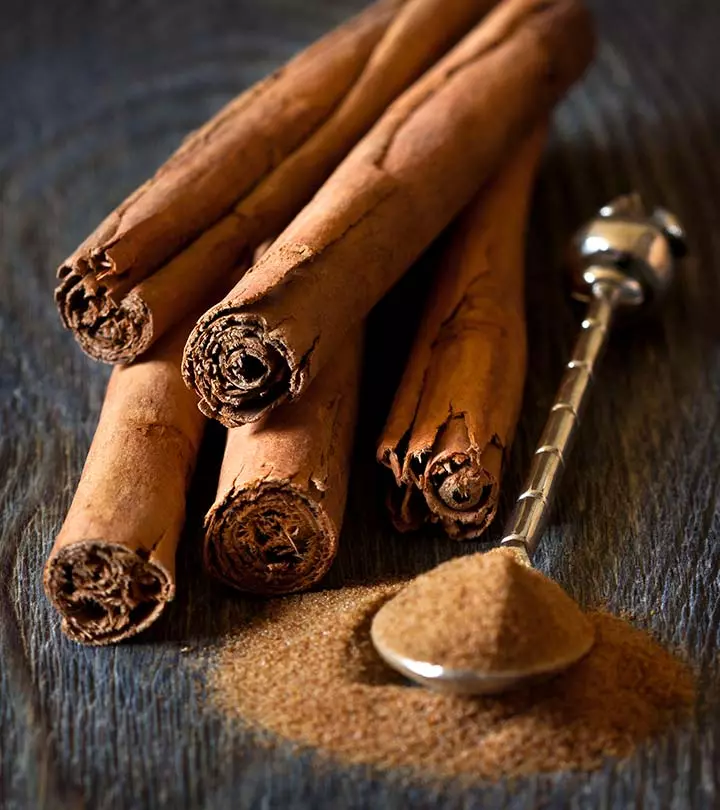
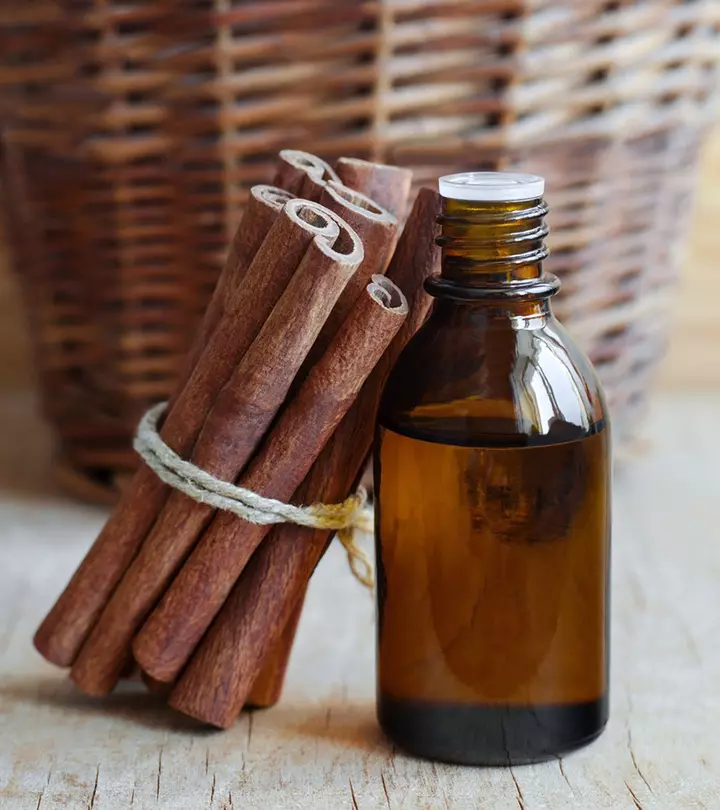
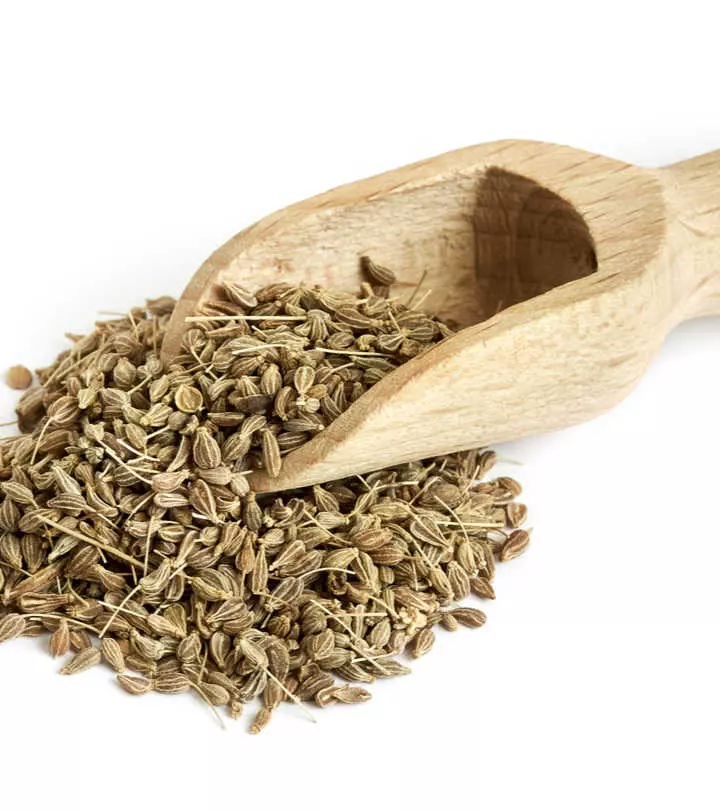

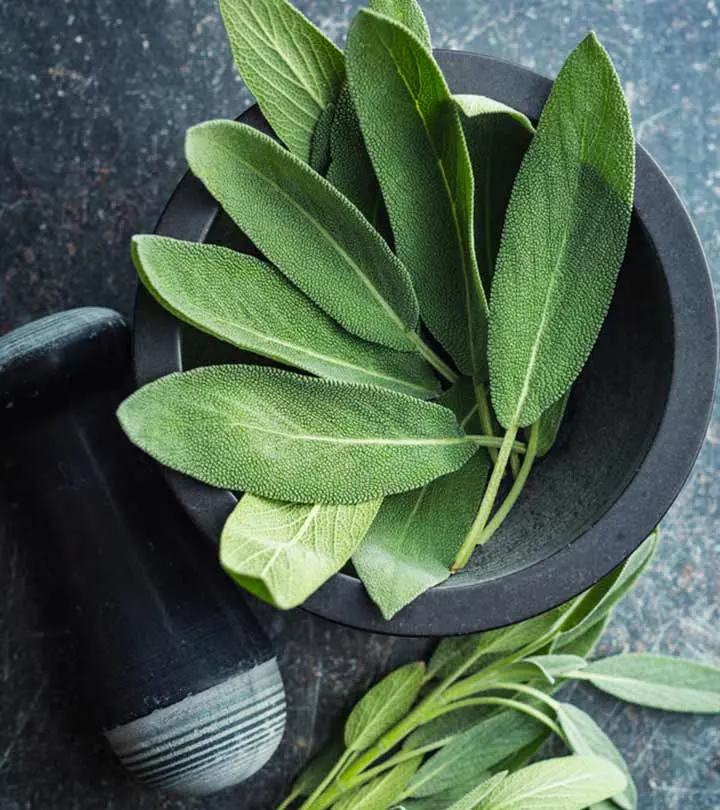
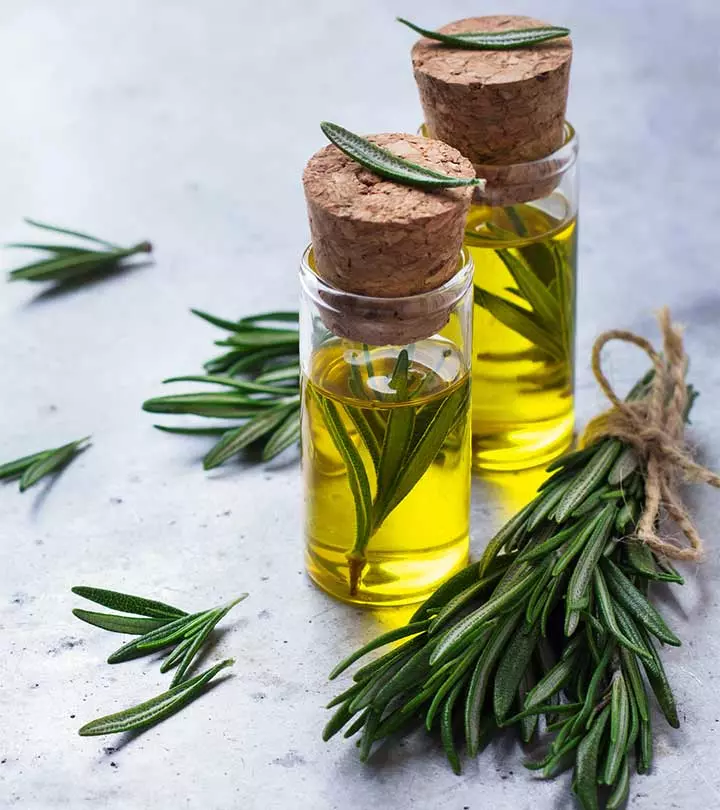
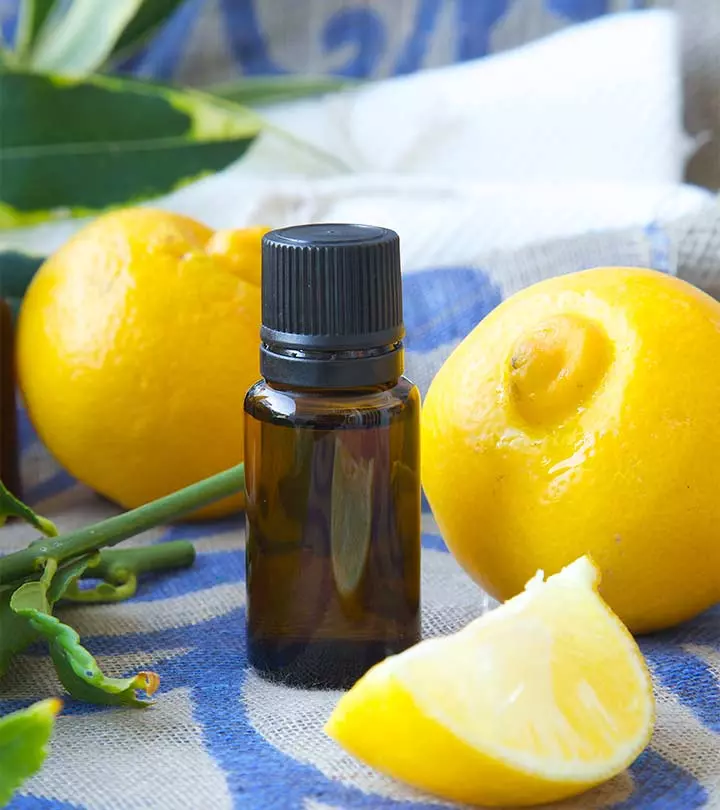
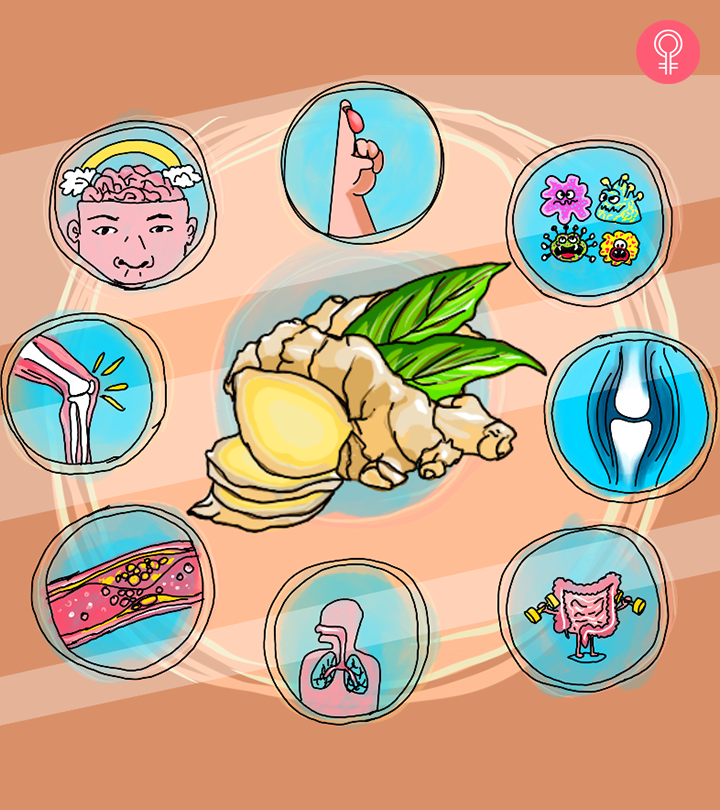
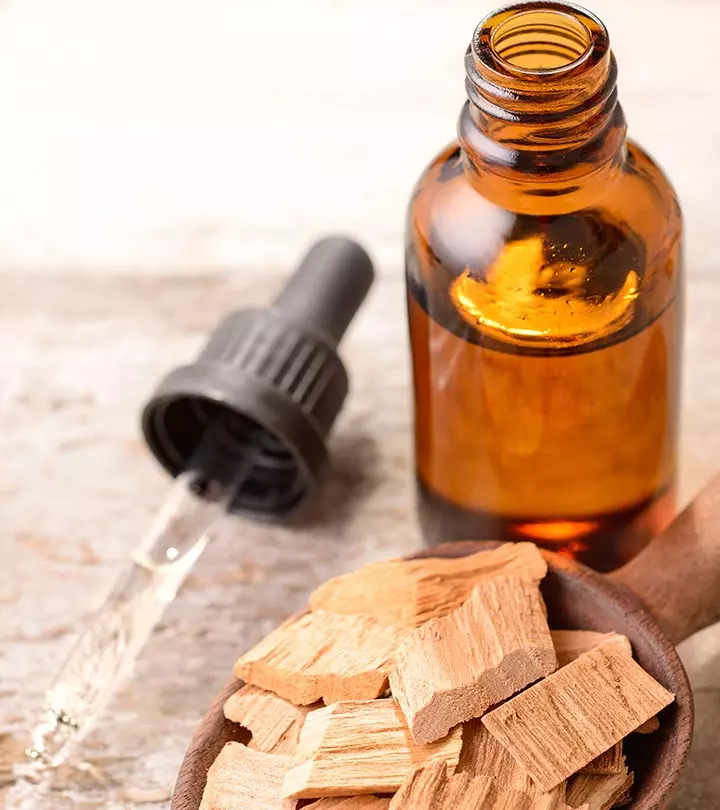



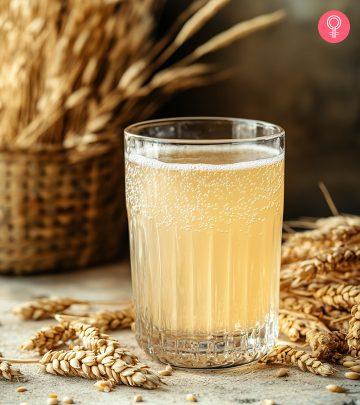

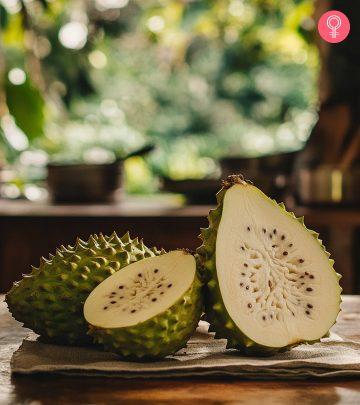


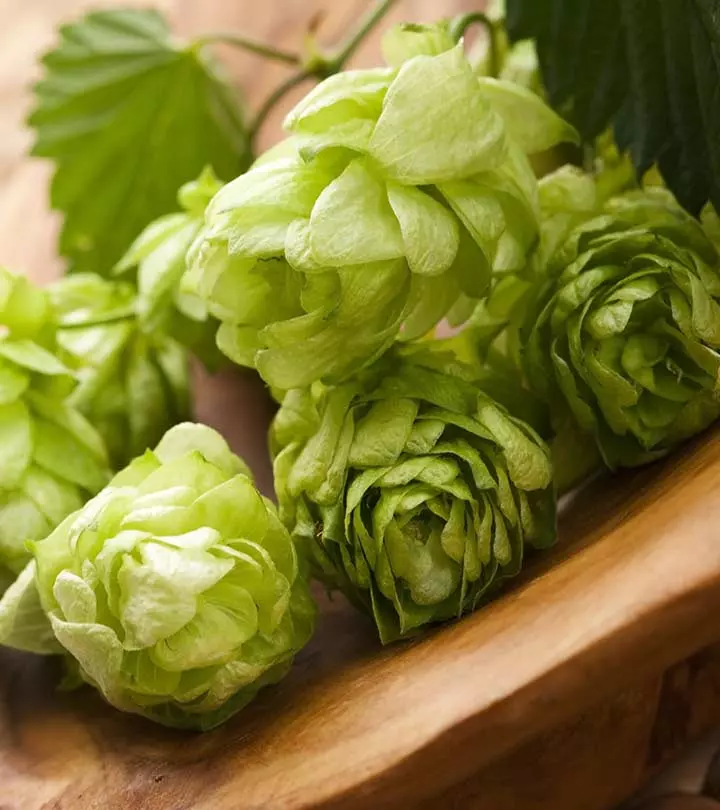

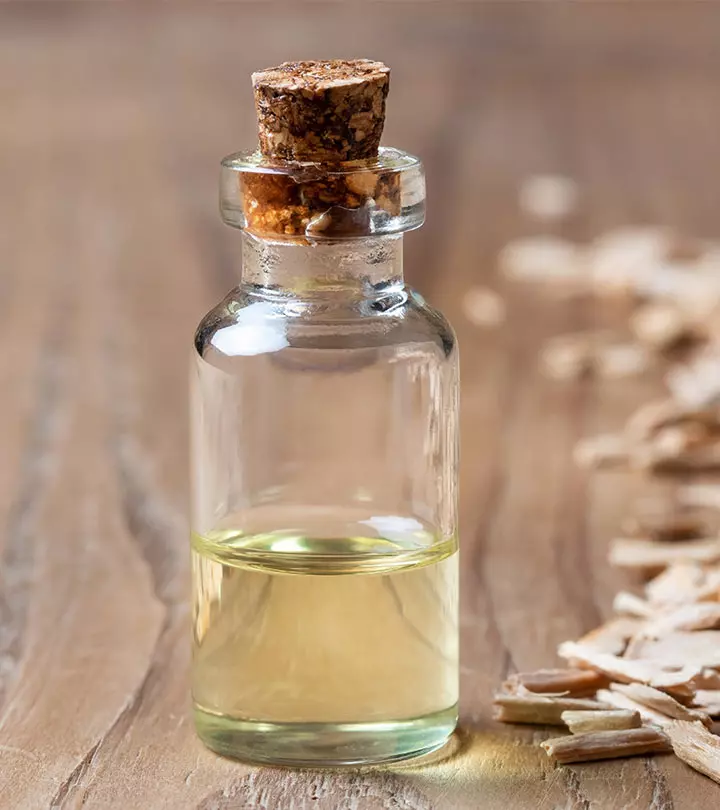
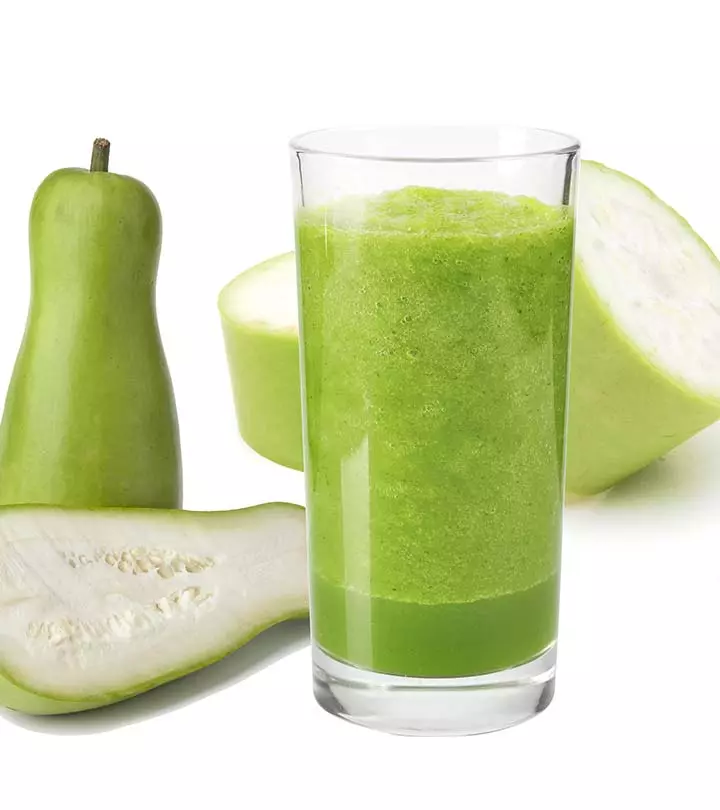
Community Experiences
Join the conversation and become a part of our empowering community! Share your stories, experiences, and insights to connect with other beauty, lifestyle, and health enthusiasts.